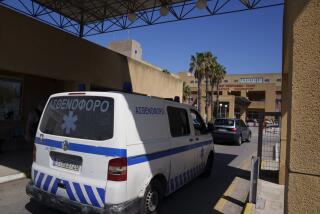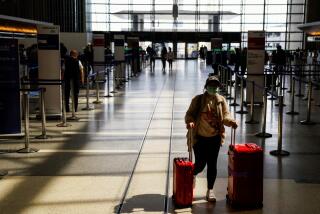Fugitive might have easily fled Cyprus
Reporting from Larnaca, Cyprus â In retrospect, it might not have been such a great idea for a district judge in this porous island-state to grant bail to an alleged Russian spymaster adept at slipping across borders, stashing huge amounts of cash and running sleeper agents in the United States.
With enough cash and connections, locals say, there are hundreds of ways in and out of Cyprus. The man who went by the name of Robert Christopher Metsos may well have found one of them.
FOR THE RECORD:
Suspected spy in Cyprus: An article in Fridayâs Section A about the disappearance of an alleged Russian spy in Cyprus said Kyriacos Iacovides was publisher of the Cyprus Weekly. He is publisher of the Cyprus Mail. â
Within hours of being arrested at the airport here Tuesday, appearing before Judge Christos Philippou and posting $34,000 cash bail, Metsos was gone â disappeared without a trace.
The keepers at his cheap apartment hotel doubt he slept a wink in his room, even though he posted a âDo Not Disturbâ sign as soon as he checked in.
âItâs very easy to escape,â said Kyriacos Iacovides, publisher and occasional editorial writer at the Cyprus Weekly. âYou could charter a boat to Syria, Lebanon or Israel, if you have enough money.â
Or, he said, you could cross over to the northern side of the divided island, for decades a Turkish republic recognized only by Turkey. âFrom there, you can get a ferry, boat or a plane to Turkey.â
And those are just for your average fugitive, not a highly trained 54-year-old alleged super-spook.
For decades, Cyprus has drawn spies, smugglers, arms dealers, exiles and a host of other characters, including burned-out war correspondents who covered the conflict in Lebanon just a short plane or boat ride away.
Wealthy Russians began migrating to the relaxed, breezy island in the early 1990s, picking up beachfront properties, mostly in the port city of Limassol.
According to legend, sunny and palm-shaded Cyprus is the birthplace of the goddess Aphrodite. It joined the European Union in 2004. But it retains its status as a geopolitical listening post. Spies for Israel and Arab countries meet with their handlers here and keep tabs on their enemies. For a price, longtime residents say, the local Russian mob in Limassol can get any job done â but big-time crooks mostly use Cyprus to park ill-gotten gains from elsewhere.
A United Nations-mandated buffer zone still divides the island and its capital, Nicosia, but people have been able to cross back and forth easily since a wall between the two enclaves was torn down in 2008. In Nicosia, the Russians and Americans have set up huge new embassies practically facing each other.
Metsos came to the attention of authorities here when his name came up on an Interpol watch list as he tried to catch a Budapest-bound flight early Tuesday from Larnacaâs shiny, new international airport. He was wanted by U.S. officials as one of 11 suspected deep cover agents of the Russian government operating illegally in the United States.
According to the U.S. indictment, Metsos traveled repeatedly to the U.S. since 2001 to meet with Russian operatives and pay them, frequently meeting them in discreet restaurants in the Sunnyside district of Queens, N.Y., and doing some hand-holding as they complained about their lives.
In 2004, Metsos and an official described as the second secretary of the Russian mission to the United Nations were spotted on the stairwell of a subway station, switching nearly identical orange bags allegedly containing cash, according to the indictment.
U.S. Justice Department officials expressed disappointment that he was released. And among Cypriot officials, the finger-pointing was beginning.
Prosecutor Marina Spiliotopoulou argued strenuously in court against granting bail. âThe republic of Cyprus asked for his continued detention,â she said in an interview. âWe pointed out all the relevant factors â that he may escape, that the crimes are serious, that he faces a long time in prison.â
Metsosâ lawyer, Michalis Papathanasiou, countered that his client probably was innocent. âThere was no strong evidence that this man has anything to do with the charges,â he said.
The lawyer said Metsos had no discernible Russian accent and had convincingly described himself as a Canadian resident who divorced 15 years ago and had a son living in Paris. But no one knows why he was in Cyprus in the first place.
Ultimately, Philippou set bail at 27,000 euros, about $34,000. Metsos quickly came up with it.
After walking out of jail, he headed to the modest Achilleos Hotel Apartments, where statues of Greek goddesses of love and hunting grace the entrance. He checked into the hotel, located in Larnacaâs lively tourist district, at around 2:30 p.m., paying with a credit card for two weeks in advance.
Revelers are on the streets of the seaside resort town into the early morning hours, heading home or to hotels past ornate Orthodox churches. But Metsos put a âDo Not Disturbâ sign on his door from the very beginning of his stay, said Inna, a receptionist who declined to give her last name.
By the time the cleaning lady entered the room the next morning, he and all of his belongings were gone.
âHe left in the night,â Inna said. âHe took everything, but no one saw him leave the hotel.â Police searched the room, but apparently found nothing.
With the airport probably off limits for him, some speculated that he might have left Cyprus by boat, hiring someone on friendly turf in Limassol to take him away in the dead of night to Syria, a Russian ally, or a waiting warship.
Police doubt that. âItâs not so easy to leave the island by boat because we have coastal patrols all the time,â said Michael Katsounoutos, a police spokesman. âWe have a surveillance cordon.â
Others said he could have made his way to the dividing line and simply walked across to Northern Cyprus, where he could have found a boat for hire at the port in Kyrenia, known also by its Turkish name, Girne.
âThe easiest way to flee out of Cyprus is through the north,â said Paul, the owner of a small boating company based in Nicosia, who did not want his family name used. âIf you can cross the border from south to north, then you can run away. You might find a smuggler. But if they know this person is wanted, nobody will risk his boat or business to help him, except for a huge amount of money.â
More to Read
Sign up for Essential California
The most important California stories and recommendations in your inbox every morning.
You may occasionally receive promotional content from the Los Angeles Times.










